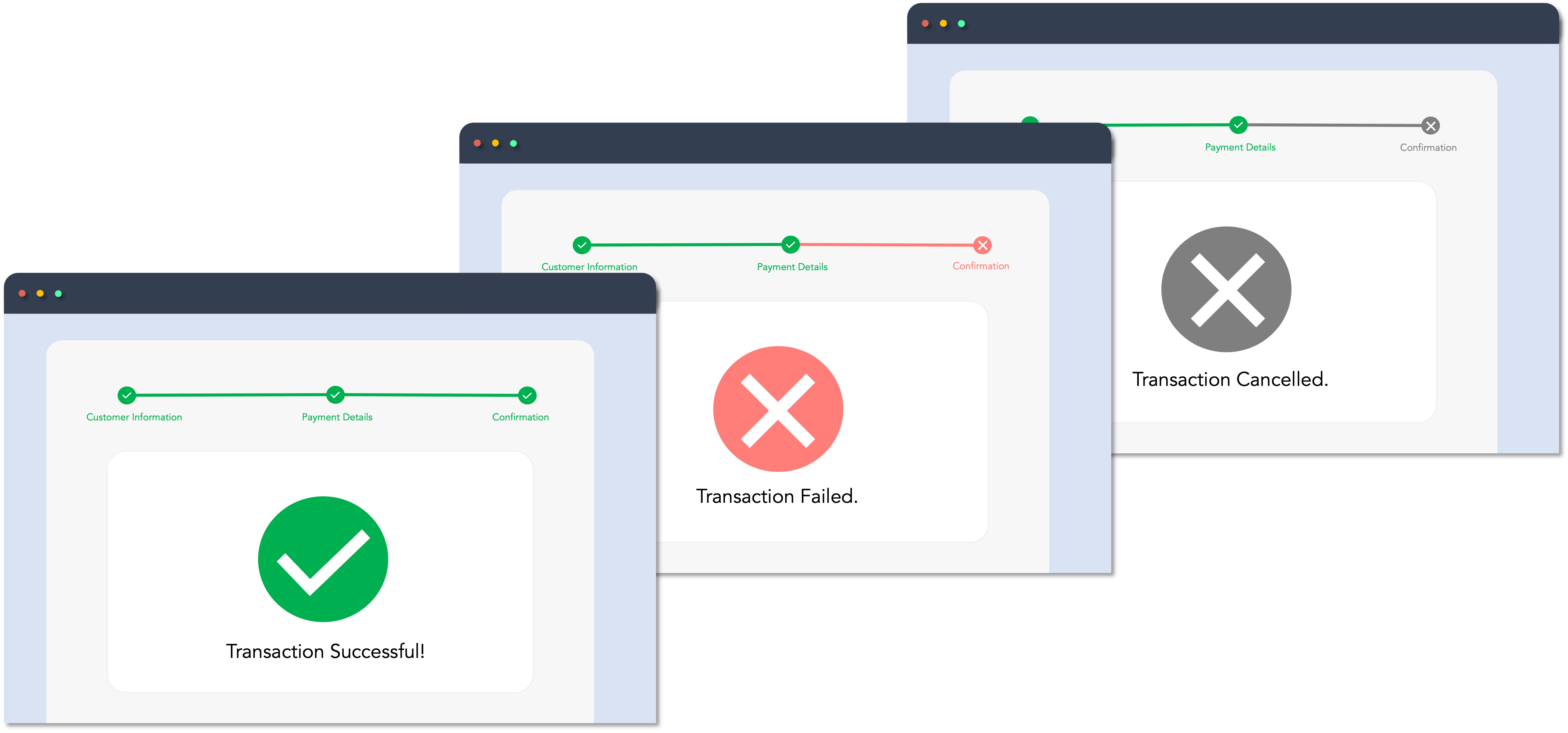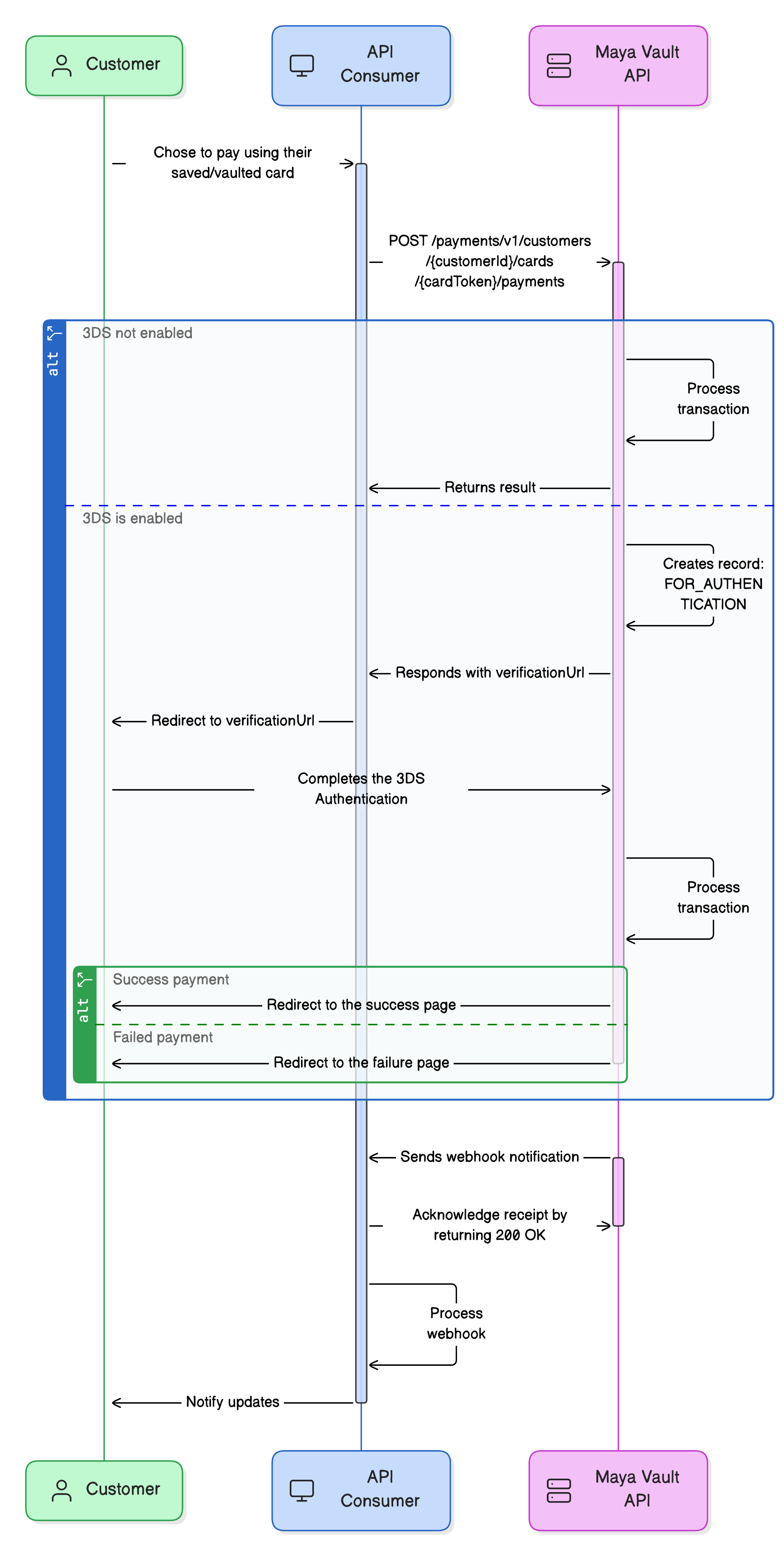Pre-requisite: To pay using vaulted cards, it is important that you have implement either of the following:
Overview
Use Maya Vault to tokenize the customers' card details for their upcoming payments, providing a secure and enhanced payment experience.
Use vaulted cards to:
- Enable customers to pay for future transactions with their saved cards.
- Facilitate scheduled payments by creating your own recurring scheduler and utilizing vaulted cards.
Experience Maya Vault on our demo website and test how it works using the Sandbox Credentials and Cards
.
API Sequence
Learn the API sequence and transaction flow of Maya Vault for Pay using Vaulted Cards.
- Customer opts to use their previously saved or vaulted cards for the payment.
- Your platform (or the API Consumer) sends the transaction request to Maya Vault via the Create Customer Payment
endpoint providing the customer's
customerIdand thecardTokenIdof the chosen card. - Maya Vault processes the transaction given the details.
- If 3DS is not enabled for future transactions using vaulted cards, Maya Vault processes the transaction and responds with the transaction result to your platform.
- If 3DS is enabled for future transactions using vaulted cards:
- Maya Vault creates a payment record with status
FOR_AUTHENTICATION - Maya Vault responds with a
verificationUrlto your platform. - Your platform then redirects the user to the
verificationUrlto complete 3DS authentication. - The user complies and completes the 3DS authentication with Maya Vault.
- Maya Vault then redirects the user to the result pages or your
redirectUrlprovided in Step 2 (success, fail).
- Maya Vault creates a payment record with status
- Maya Vault sends a webhook notification to your platform.
- Your platform acknowledges the webhook payload and returns
200 OK. Please avoid processing complex logic before you reply to webhook to avoid timeouts. - Your platform parses and processes the webhook payload.
- Your platform notifies the customer of the updates of the transaction.
Build your Integration
This solution uses Basic Authentication, which requires API keys to authenticate incoming requests. To obtain your API key, please refer to the Generate API Keys for Online Payments guide.
Create your Response pages
Design and host your own response web pages.
Every payment state should show an appropriate web page for the customer to know the status of their transaction. You need to host these pages on your website.
Created URLs will be used in the redirectUrl object on the Create Customer Payment transaction request defining where the customer will be redirected when processing the transaction.

Use Vaulted Cards for Upcoming Payments
You can use the customer's vaulted card to pay for their future transactions.
For paying future transactions using the vaulted card, your application must call the Create Customer Payment endpoint. This step requires the following:
cardTokenor thecardTokenIdfrom the Create Card of Customerendpoint
customerIdor theidacquired from the Create Customerendpoint
- the necessary transaction details
Depending on the payment status, customers will be redirected according to the URL specified under the redirectUrl object of the Create Payment API.
Monitor Real-time Transaction Events
Monitor and receive transaction updates.
Maya uses webhooks to keep your application informed about critical events related to your payment requests. These notifications include updates on payment status (e.g., success, failure, cancellation) along with relevant response codes. Webhooks allow you to react to real-time events and automate transaction handling within your system.
To help you get started, refer to the following resources:
If your application does not receive a webhook notification—for example, due to network issues or configuration errors—you can fall back on the following retrieval endpoints to check the transaction status manually:
Endpoints
The following are the Maya Vault API endpoints relevant for Paying using Vaulted Cards.
| Name | HTTP Method | Key Type | Endpoint | Description |
|---|---|---|---|---|
| Create Customer Payment | POST | SECRET | /payments/v1/customers/{customerId} /cards/{cardToken}/payments | Initiates payments using the inputted cardToken (the selected vaulted card) as the payment source of the customer identified by the customerId. |
Managing Payment Transactions
| Name | HTTP Method | Key Type | Endpoint | Description |
|---|---|---|---|---|
| Retrieve Payment via ID | GET | SECRET | /payments/v1/payments/{paymentId} | Retrieves a comprehensive transaction details of the payment identified by the provided paymentId. This will yield an array containing the payment information. |
| Retrieve Payment via RRN | GET | SECRET | /payments/v1/payment-rrns/{rrn} | Retrieve transaction information by providing the merchant's request reference number (rrn), similar to the Retrieve Payment via ID endpoint. |
| Retrieve Payment Status | GET | PUBLIC | /payments/v1/payments/{paymentId}/status | Returns the status of the payment identified by paymentId. |
| Cancel Payment via ID | POST | SECRET | /payments/v1/payments/{paymentId}/cancel | Cancel a payment transaction using the paymentId before it's authorized and the card payment is completed. |
Business Rules to Code
To supplement your knowledge of the integration, it is essential to familiarize the Business Rules to Code for Online Payments . This ensures that technology requirements and other development considerations are met.
At this point, you have understood the following:
- The necessary APIs and their endpoints
- The sequence and purpose of each API
- The prerequisites for building your integration
Will 3DS authentication be required when using a vaulted card?
Answer: It will only be asked during the first transaction of the customer. Contact your Maya Relationship Manager to learn more.
Can I build my recurring scheduler for payments?
Answer: Yes, you can create your scheduler and call Create Customer Payment according to your business rules.
Can I enable 3DS in payments using vaulted cards?
Answer: You may reach out to your Maya Relationship Manager to discuss and request turning on 3DS for future payments of vaulted cards. However, you will need to consider changes to the API Handling:
- If 3DS is not enabled for future transactions using vaulted cards, Maya Vault will return the payment result.
- If 3DS is enabled for future transactions using vaulted cards, Maya Vault will provide a
verificationUrl, where you need to redirect the customer to complete the 3DS authentication. After completing the 3DS authentication, Maya Vault will redirect the customer to your result page.
My transaction in Sandbox keeps failing. How can I fix this?
Answer: First, ensure your code is implemented correctly by reviewing the required steps. If your setup is correct but errors persist, check the Sandbox Health Page to verify if the service is operational. If the service is up, retrieve the error code and use the search box in the Maya Developer Hub to find relevant guides on resolving it.
Getting timeouts when connecting to the Sandbox of Maya. How can we resolve this?
Answer: If you're encountering timeouts in the Sandbox, first check the Sandbox Health Page to see if the service is operational. If the service is up but the issue persists, visit our Support Page
for the appropriate channel to escalate your concern.
